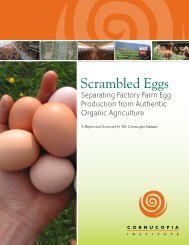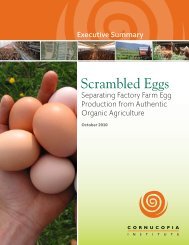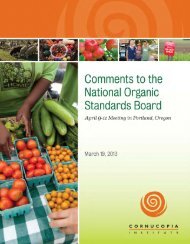“Behind the Bean” (pdf) - Cornucopia Institute
“Behind the Bean” (pdf) - Cornucopia Institute
“Behind the Bean” (pdf) - Cornucopia Institute
Create successful ePaper yourself
Turn your PDF publications into a flip-book with our unique Google optimized e-Paper software.
The SoyInfo Center, which promotes soy foods as a healthy, environmentally friendly, and humane alternative to meat<br />
products, has a database of approximately 1,000 scientific, peer-reviewed, published studies showing health benefits of eating<br />
soy foods.<br />
However, not all researchers and advocacy groups agree about <strong>the</strong> benefits of soy in <strong>the</strong> human diet. The Weston A. Price<br />
Foundation’s (WAPF) president, Sally Fallon, objects to <strong>the</strong> widespread promotion of soy foods as a miracle health food.<br />
WAPF’s web site lists scientific studies indicating that soy consumption, especially excessive consumption of isolated soy<br />
ingredients, may be harmful to one’s health. Fallon says, “The propaganda that has created <strong>the</strong> soy sales miracle is all <strong>the</strong><br />
more remarkable because only a few centuries ago <strong>the</strong> soybean was considered unfit to eat—even in Asia.” 64<br />
Today, many Americans are familiar with <strong>the</strong> health benefits of soy foods through <strong>the</strong> FDA-approved “heart healthy” claim<br />
on food packages containing soy protein ingredients. It is important for American consumers to understand that this health<br />
claim is a direct product of corporate boardrooms searching for ways to sell more soy products—and to turn <strong>the</strong> soy “waste”<br />
by-products of soybean oil extraction into profits. In 1999, <strong>the</strong> FDA approved a health claim for soy foods: “Diets low in<br />
saturated fat and cholesterol that include 25 grams of soy protein a day may reduce <strong>the</strong> risk of heart disease.” 65<br />
This health claim was first proposed in 1998 not by doctors or public interest groups, but by Protein Technologies International,<br />
a company that stood to profit tremendously if it could convince <strong>the</strong> American public to buy more soy protein (Protein<br />
Technologies International is now known as Solae). The key to selling more soy protein was convincing <strong>the</strong> American<br />
public that soy protein was a desirable product, and a health claim would go a long way to establish this reputation. Health<br />
claims on foods have long been recognized as an effective marketing tool. Even on <strong>the</strong> FDA web site, <strong>the</strong> value of health<br />
claims to corporate profits is acknowledged: Brian Sansoni, senior manager for public policy at <strong>the</strong> Grocery Manufacturers<br />
of America is quoted as saying that “[a health claim] brings attention to products; <strong>the</strong>re are newspaper and TV stories and<br />
information on <strong>the</strong> Internet.” So what better way to convince <strong>the</strong> American public to spend money on soy protein than to<br />
widely spread <strong>the</strong> message that it could reduce heart disease? With corporate funding, scientists published articles making<br />
this connection. In a cloud of controversy and doubt in <strong>the</strong> scientific community, <strong>the</strong> FDA allowed <strong>the</strong> health claim in 1999,<br />
opening <strong>the</strong> door to a new world of opportunity and profits for soy processors.<br />
In her book Food Politics, which explores <strong>the</strong> influences of <strong>the</strong> food industry on nutrition policy, New York University Professor<br />
of Nutrition Marion Nestle explains that “under <strong>the</strong> various laws and court decisions governing FDA’s actions in this<br />
area, <strong>the</strong> agency must approve claims backed up by well-conducted studies, no matter how out of context <strong>the</strong>y may be or<br />
how quickly contradicted by fur<strong>the</strong>r research.” 66<br />
When <strong>the</strong> U.S. Agency for Healthcare Research and Quality reviewed <strong>the</strong> scientific evidence related to soy protein and<br />
cardiovascular health in 2005, it found few credible studies to support <strong>the</strong> heart health claim. Based on its review of more<br />
than 50 scientific studies, <strong>the</strong> committee found that soy consumption had “no effect on HDL cholesterol levels,” “nei<strong>the</strong>r<br />
isoflavone or soy protein dose was associated with net effect on triglycerides,” and “soy consumption does not appear to affect<br />
blood pressure level.” 67<br />
The American Heart Association (AHA) has also strongly recommended that <strong>the</strong> heart healthy claim be removed. The<br />
AHA initially supported <strong>the</strong> heart healthy claim for soy protein, but after <strong>the</strong>ir expert committee reviewed <strong>the</strong> scientific<br />
research, <strong>the</strong> organization rescinded its support. In February 2008, <strong>the</strong> president of <strong>the</strong> AHA wrote to <strong>the</strong> FDA that <strong>the</strong><br />
organization “strongly recommends that FDA revoke <strong>the</strong> soy protein and CHD health claim.” He stated, “There are no<br />
evident benefits of soy protein consumption on HDL cholesterol, triglycerides, lipoprotein(a), or blood pressure. Thus, <strong>the</strong><br />
direct cardiovascular health benefit of soy protein or isoflavone supplements is minimal at best.” 68<br />
Many of <strong>the</strong> studies showing benefits to eating highly processed soy foods, as well as <strong>the</strong> health claim on <strong>the</strong>se highly processed<br />
foods, are funded ei<strong>the</strong>r by corporations or soybean grower associations. 69 These foods contain novel and highly<br />
processed isolated nutrients, and organic consumers looking for wholesome nutrition should be skeptical of “heart healthy”<br />
claims found on <strong>the</strong>se food packages.<br />
Whole foods, minimally processed, are preferable. Soy foods such as tofu, and especially fermented soy foods such as miso<br />
and tempeh, have long been part of traditional Asian diets and are viewed by many as a much more wholesome and healthful<br />
choice than foods with soy protein isolates or concentrates.<br />
32 Behind <strong>the</strong> bean: The Heroes and Charlatans of <strong>the</strong> Natural and Organic Soy Foods Industry.





